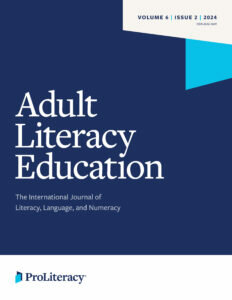It is hard to deny that more of our daily tasks are becoming digitized. Everything from banking to making a phone call to reading this press release requires some form of digital skills. New research from leaders in the adult literacy field examines how this reality can have an impact on adults with low literacy and low digital literacy skills.
 The research articles, published in our new issue of Adult Literacy Education: The International Journal of Literacy, Language, and Numeracy, recognize the importance of increased digital literacy skills as technology continues to advance. But for those whose low-literacy skills already make daily tasks a struggle, it’s even more of a necessity to introduce and build the critical thinking skills necessary to use digital tools.
The research articles, published in our new issue of Adult Literacy Education: The International Journal of Literacy, Language, and Numeracy, recognize the importance of increased digital literacy skills as technology continues to advance. But for those whose low-literacy skills already make daily tasks a struggle, it’s even more of a necessity to introduce and build the critical thinking skills necessary to use digital tools.
In a qualitative study, led by Chih-Wei Wang of Texas A&M University, adult education program directors shared their perspectives on integrating technology into their programs. The insights from this study, including the contributing factors and barriers to incorporating technology with low-literate adults, are described in one research article along with recommendations for improvement.
According to other research presented in this issue, led by Kristin Skowranek of Hamburg University, adults with limited literacy are frequent social media users, opening them up to inaccurate and fake news. Inadequate digital literacy and critical thinking skills can lead low-literate adults to false health information on social media. The authors assess how the shift of health information into the digital space relates to social vulnerability.
“The issues examined in these research articles are important because technology is only going to continue to grow as a part of our lives. By understanding how low-literate adults are engaging with technology, we have a foundation from which to identify the biggest needs and address them,” said Mark Vineis, ProLiteracy president and CEO. “Our research journal is a critical asset for the field in that regard of looking at the issues facing adult learners and educators today.”
In the research journal, adult literacy practitioners, researchers, funders, and policymakers can find evidence-based information to guide their practice, prompt important discussions, and build awareness.
We partner with Rutgers University to produce Adult Literacy Education. The journal editors—Alisa Belzer, Amy Rose, and Heather Brown—are leading researchers in the adult literacy and education field who believe research is an important complement to practitioners’ experiences, intuition, and professional training.
We publish the free online journal three times per year to share the latest research and best practices in adult literacy, numeracy, and English language education. Each article in Adult Literacy Education goes through a blind peer-review process to ensure we are publishing the highest quality information that the field can trust and use.
Writers interested in submitting articles for consideration in future issues of the journal can find author guidelines and a submission form on the journal’s webpage.
By keeping our research free, we can ensure that the important information shared in the journal can benefit all adult learners equally.